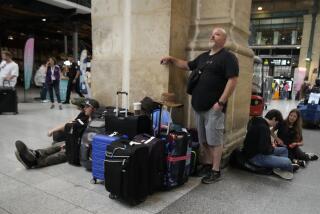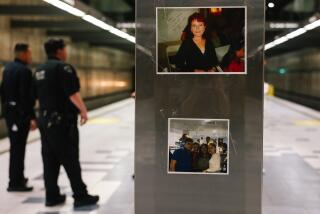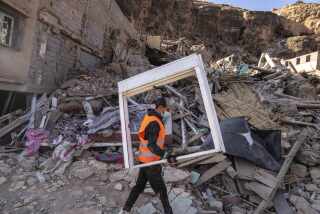Police Hunt More Madrid Bombing Suspects
- Share via
MADRID — Police hunted Tuesday for Moroccan extremists suspected in last week’s bombings of commuter trains here while trying to determine how the plotters may be tied into terrorist networks behind the Sept. 11 attacks and suicide bombings last year in Casablanca, Morocco.
A top suspect arrested last week in the Spain bombings is a Moroccan immigrant named Jamal Zougam, whom witnesses have placed aboard one of the targeted trains just before the explosions. Zougam, 30, was an associate of a Moroccan fugitive, Amer Aziz, who was charged last fall with belonging to a Madrid Al Qaeda cell that played a support role in the Sept. 11 attacks in the U.S., a senior Spanish investigator said Tuesday.
More recently, U.S. investigators informed Spanish counterparts that interrogations of terrorism suspects held at Guantanamo Bay, Cuba, had revealed direct contacts between Aziz and the plotters of the Sept. 11 attacks, the investigator said.
“Aziz was one of the principal figures in the Al Qaeda cell in Madrid,” the senior Spanish official said. “There are statements made in Guantanamo that connect him to Sept. 11. And he had connections to several of the suspects arrested last week.”
Police found Aziz’s phone number during a search of Zougam’s apartment in 2001, but Zougam was not accused of a crime. Aziz evaded capture by fleeing to Iran, according to court documents.
Spanish police say intercepted communications last year revealed that Aziz “was in Iran with Abu Musab Zarqawi,” whom U.S. officials have accused of masterminding numerous bombings in Iraq in the last year.
Zarqawi’s network has also been implicated in the planning of suicide attacks last May that killed 45 people, including 12 bombers, in Casablanca, according to Spanish court documents. Investigators say the Zarqawi network appears to have become a new umbrella for Islamic extremist groups in Europe and the Mideast that have been splintered by a worldwide crackdown since September 2001.
In the aftermath of the Casablanca blasts, Spanish and Moroccan authorities began monitoring Zougam and his half-brother, Mohamed Chaoui, because of their contacts with Moroccan extremists arrested in that case, the senior official said.
But Zougam and the others in Madrid were not under surveillance at the time of the train bombings, the senior official said. Neither Spanish nor U.S. intelligence agencies picked up conversations or movements suggesting that Islamic networks were preparing a strike in Madrid, the official said.
“The Americans have told us they didn’t sense anything, they didn’t see anything coming,” the official said.
There is another apparent thread between the Sept. 11 case, the Casablanca attacks and the Madrid train bombings: a Moroccan imam named Mohammed Fizazi who is serving a 30-year sentence in his country.
Fizazi served as the spiritual leader of the Casablanca attackers, who struck a Spanish restaurant and four other targets. In recent years, the imam divided his time between Tangier, Morocco, and Hamburg, Germany, where he preached at a mosque attended by Sept. 11 plotters, according to Italian court documents.
Zougam, a native of Tangier, was a follower of Fizazi, according to Spanish court documents. Zougam moved back and forth between Madrid and Morocco, part of a legal and illegal movement of people and goods that resembles the migratory and commercial flow between Mexico and California.
For years, Islamic extremists have used Spain as a gateway: They have passed through on their way back to Europe via Morocco from Al Qaeda camps in Afghanistan, and fled through Spain across the Mediterranean when European police cracked down. Last week’s attacks heightened fears that terrorists could blend into the Spain-Morocco flow to carry out a mission on European soil.
Besides Zougam, two other Moroccan immigrants have been arrested on charges of providing the cellphones used as remote detonators in the train bombings. Two Indian immigrants also have been arrested in relation with the phone equipment.
Police were searching for six to eight more Moroccans identified as suspects in the bombings, officials said Tuesday.
Police were also analyzing a video in which a self-styled military chief of the Al Qaeda terrorist network in Europe claimed responsibility for the bombings.
Despite the hunt for new suspects and the web of connections between cases and networks, investigators said the train bombings were not necessarily a large-scale operation ordered by a leader such as Zarqawi, who is believed to be in Iran or Iraq.
Meanwhile, the FBI was checking fingerprints and backgrounds of the arrestees at the request of Spanish police, law enforcement officials said. The death toll rose to 201 Tuesday when a woman died of her wounds at a Madrid hospital.
And investigators prepared Tuesday to question an Algerian ex-convict who allegedly made comments in January that suggested he had prior knowledge of the attacks. The Algerian, identified as Ali Amrous, got into an altercation with police during an anti-drug operation in the northern city of San Sebastian. Enraged, Amrous told the officers that soon Madrid would be filled with corpses and made an apparent reference to Atocha station, where some of the bombs went off last week.
After the bombings, officers remembered the encounter and tracked Amrous down.
More to Read
Sign up for Essential California
The most important California stories and recommendations in your inbox every morning.
You may occasionally receive promotional content from the Los Angeles Times.










